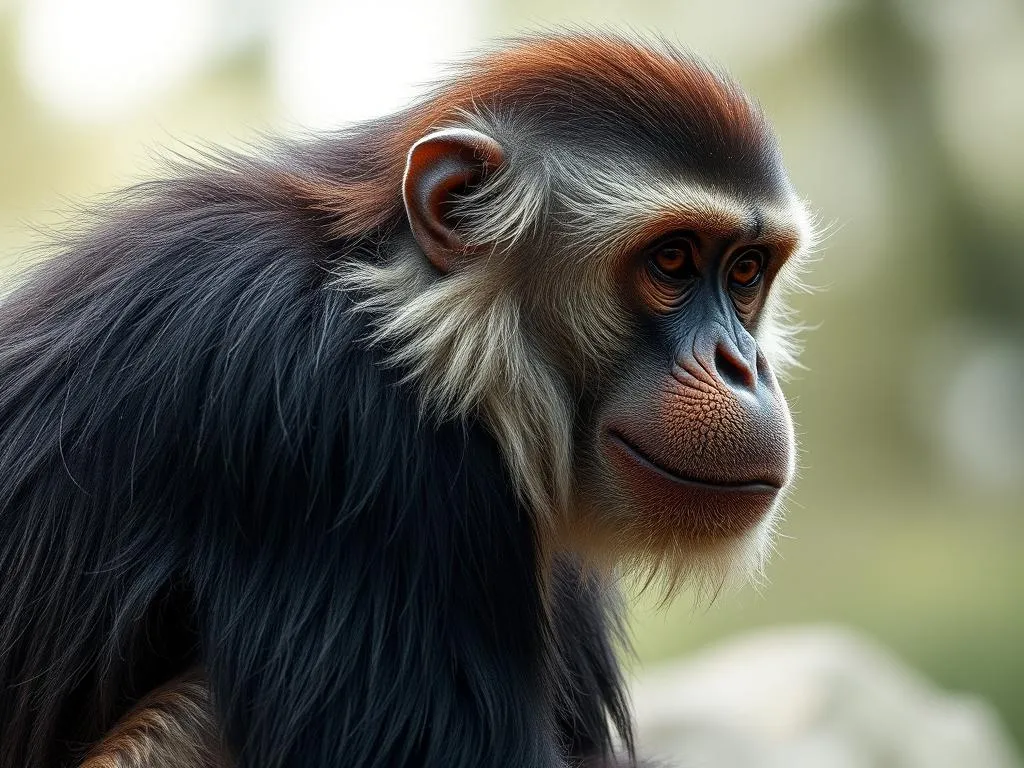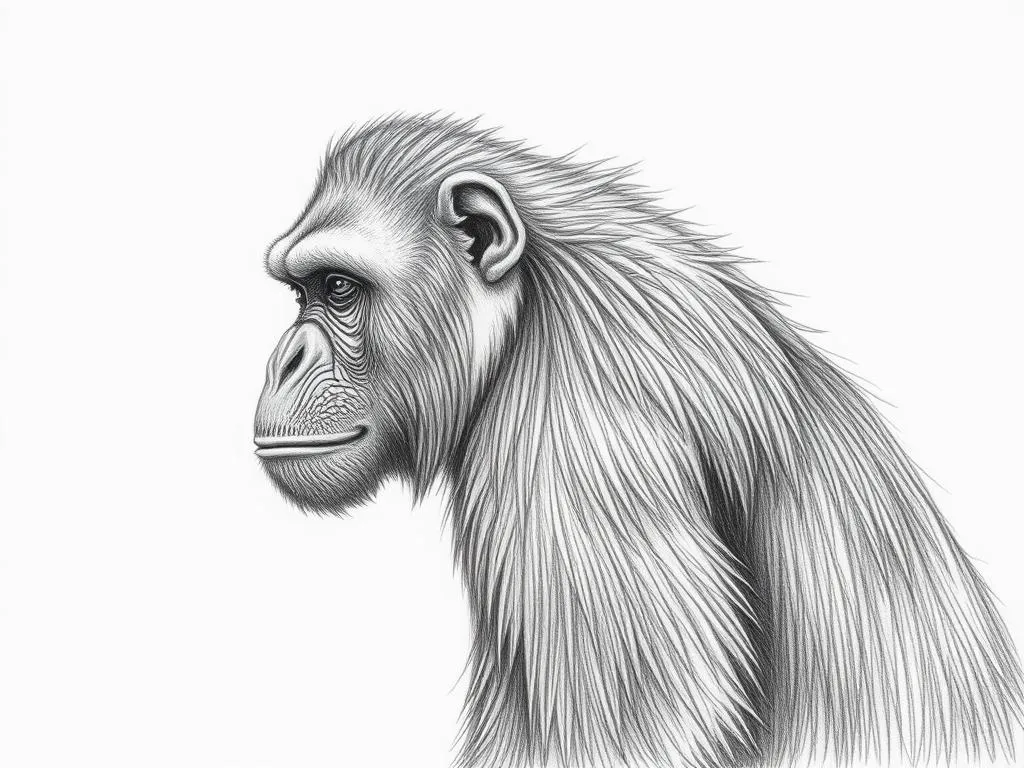The Profound Symbolism of Apes: Nature’s Intelligent Primates

Disclaimer: Some images on this website are AI-generated artworks and may not accurately represent real animals.
The symbolism of apes holds deep meanings that resonate across cultures and generations. These remarkable creatures, often seen as our closest relatives in the animal kingdom, embody a wealth of characteristics that inspire awe and reflection. From their intelligence to their playful nature, the meaning of apes extends far beyond their biological classification, inviting us to explore our connections to them.
Understanding the Ape
Classification and Characteristics
Apes are fascinating members of the primate family, distinct from monkeys and other species. They belong to the superfamily Hominoidea and are divided into two main categories: the lesser apes and the great apes.
| Ape Species | Characteristics |
|---|---|
| Gorillas | The largest of the apes, known for their muscular build. They live in social groups led by a dominant male. |
| Chimpanzees | Highly intelligent and social animals, known for their complex behaviors and tool use. |
| Orangutans | Primarily arboreal, these apes are known for their red fur and solitary nature. |
| Gibbons | Lesser apes characterized by their long arms and vocal capabilities, often found swinging through trees. |
These unique physical and behavioral traits make apes stand out in the animal kingdom. Their social structures are intricate, often involving family bonds and hierarchies that mirror human relationships. The intelligence of apes is particularly striking; they exhibit problem-solving abilities, tool use, and even emotional depth.
Cultural Significance
Throughout history, apes have held a significant place in human culture. They appear in various forms of art and folklore, often symbolizing different human traits. In mythology, apes have been associated with creation stories, wisdom, and trickery.
In many African cultures, for instance, the monkey is considered a trickster figure, teaching valuable lessons through its antics. In Asian cultures, the monkey is often revered, as seen in the character of the Monkey King in the epic tale “Journey to the West.” Such representations highlight the multifaceted roles that apes play in human narratives and belief systems.

Symbolism & Spiritual Meaning
Wisdom and Intelligence
The connection between apes and human intellect is profound. Ape symbolism often reflects wisdom, intelligence, and the quest for knowledge. As creatures that share a significant percentage of their DNA with humans, apes serve as reminders of our evolutionary journey. Their problem-solving abilities and social interactions provide important lessons in cooperation and community.
Observing how apes communicate and solve problems can inspire us to embrace our own intellect and creativity. Their ability to use tools, from sticks to retrieve termites to stones for cracking nuts, illustrates a form of ingenuity that we can aspire to in our own lives.
Playfulness and Joy
Another powerful aspect of ape symbolism is their embodiment of playfulness and joy. Apes, especially young ones, are known for their exuberance and curiosity. They engage in playful behaviors that remind us of the importance of maintaining a childlike spirit in our lives.
Play serves a critical role in the development of social bonds and learning. Just as apes frolic and explore, we are encouraged to embrace our sense of wonder and curiosity. This joy in life and the ability to find happiness in simple moments is a vital lesson that apes can teach us.
Connection to Nature
Apes symbolize a connection to our primal instincts and remind us of our place within the natural world. Their existence highlights the intricate relationships within ecosystems. As they navigate their environments, apes interact with other species and contribute to the balance of their habitats.
The meaning of apes extends to our responsibility towards nature. As intelligent beings, we share a duty to protect and preserve the environment that sustains all life. Apes, as ambassadors for wildlife conservation, encourage us to reflect on our actions and their impacts on the planet.
Apes in Dreams
Common Dream Scenarios
Dreams involving apes can be vivid and impactful, often carrying significant symbolism. Here are some common scenarios:
| Dream Scenario | Meaning and Interpretation |
|---|---|
| Encountering a playful ape | Represents joy, creativity, and the importance of playfulness. |
| Seeing an aggressive ape | May symbolize repressed anger or conflict in waking life. |
| Observing a group of apes interacting | Reflects social dynamics and the need for community in your life. |
| An ape teaching or guiding you | Signifies the acquisition of wisdom and guidance from your experiences. |
These dream scenarios can provide insights into our subconscious minds. The presence of an ape in a dream may reveal our hidden desires, fears, or the aspects of ourselves that we need to explore further.
Personal Reflection
Dream analysis is a powerful tool for self-reflection. When you encounter an ape in your dreams, consider what feelings and thoughts arise. Do you feel joy, fear, or curiosity? Analyzing these emotions can help reveal underlying issues or aspirations in your waking life.
Understanding the symbolism of apes in dreams encourages a deeper connection with our inner selves. It invites us to embrace the lessons they represent—wisdom, playfulness, and a connection to our primal nature.
Modern Interpretations
Apes in Popular Culture
In contemporary society, apes continue to capture our imagination. They are frequently featured in films, literature, and media, often serving as symbols of intelligence, humor, and humanity. Movies like “Planet of the Apes” explore the complexities of evolution and morality, while children’s films often depict apes as lovable and playful characters.
These representations shape our perceptions of apes and highlight the ongoing fascination with their symbolic meanings. As we engage with these narratives, we are reminded of the shared traits between humans and apes, encouraging empathy and understanding.
Conservation and Awareness
The symbolism of apes extends to important discussions about wildlife protection and environmental conservation. As endangered species, apes serve as powerful symbols for the fragility of our ecosystems. Their plight raises awareness about habitat destruction, poaching, and the need for sustainable practices.
Organizations dedicated to ape conservation often use the intelligent and relatable nature of these creatures to rally support. By recognizing apes as symbols of nature’s beauty and complexity, we are encouraged to take action to protect not only them but the entire ecosystem they inhabit.
Key Takeaways
- Ape symbolism encompasses wisdom, intelligence, playfulness, and a connection to nature.
- Observing ape behavior can inspire us to embrace our own intellect and creativity.
- Dreams involving apes may reveal important insights about our subconscious and emotions.
- Apes play significant roles in popular culture, shaping our perceptions and understanding of intelligence and humanity.
- The conservation of apes highlights the importance of protecting our environment and wildlife.
Conclusion
Reflecting on the symbolism of apes invites us to appreciate these intelligent creatures and their significance in our lives. They serve as reminders of our evolutionary heritage, the importance of joy and play, and our responsibilities towards nature. By understanding the lessons that apes impart, we can cultivate a deeper connection with both them and the world around us, fostering a greater appreciation for the rich tapestry of life that we share.







